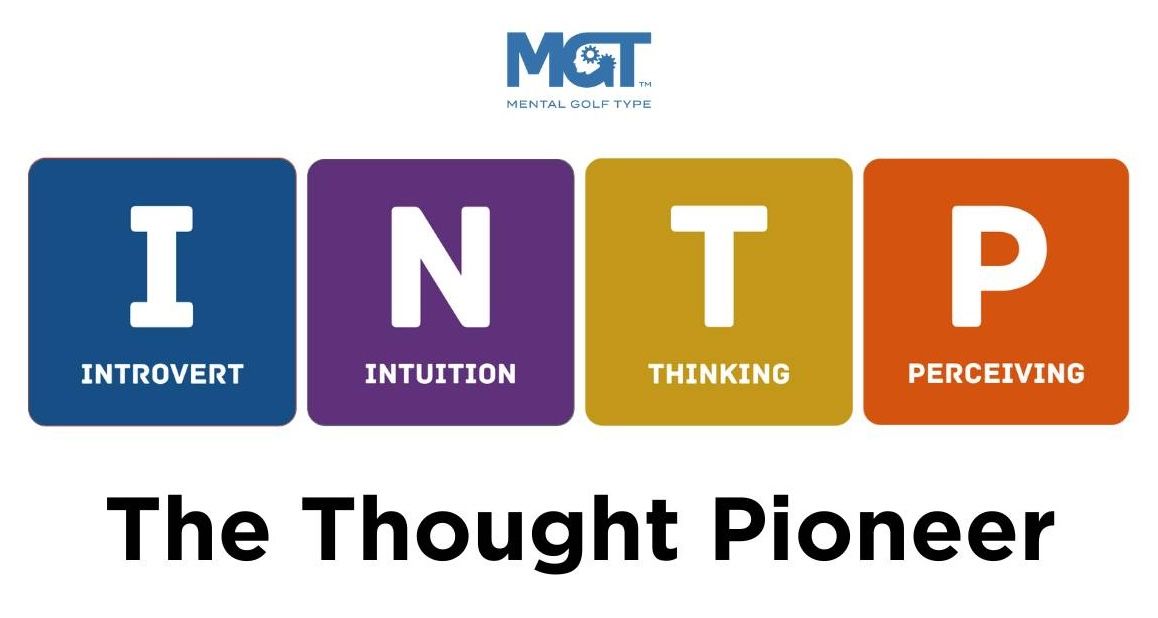Your Mental Golf Type® Results
Your INTP Personality Report (Life)
Approximately 1% of the population, INTPs are profound and innovative thinkers, effortlessly unraveling complex problems and advancing knowledge with their sharp intellect and original insights.
General Descriptors:
- Independent: You value autonomy and prefer to work on your own, allowing for freedom in your thought processes.
- Reflective: Deep thinking and contemplation are natural to you, often leading to innovative insights.
- Theoretical: You engage primarily with ideas and abstract concepts rather than practical applications.
- Intellectual: Your approach to life is fundamentally intellectual, often centered on exploring complex ideas.
- Detached: You maintain an objective viewpoint, often appearing aloof in social settings.
- Curious: Your desire to understand the world drives you to constantly question and analyze.
Best Mode: Introverted Thinking
Your most effective mode of operation leverages Introverted Thinking, where you excel in analyzing and structuring your thoughts independently. This cognitive function allows you to approach problems with a logical and systematic method, often leading to innovative and unconventional solutions. You thrive in environments where you can ponder complex issues quietly, constructing and deconstructing ideas without external interference. Your strength lies in your ability to delve deeply into subjects, extracting and reformulating concepts to create clear, strategic insights that others may overlook.
ContinueJoin Our Free Trial
Get started today before this once in a lifetime opportunity expires.
Approximately 1% of the population, INTPs are profound and innovative thinkers, effortlessly unraveling complex problems and advancing knowledge with their sharp intellect and original insights.
General Descriptors:
- Independent: You value autonomy and prefer to work on your own, allowing for freedom in your thought processes.
- Reflective: Deep thinking and contemplation are natural to you, often leading to innovative insights.
- Theoretical: You engage primarily with ideas and abstract concepts rather than practical applications.
- Intellectual: Your approach to life is fundamentally intellectual, often centered on exploring complex ideas.
- Detached: You maintain an objective viewpoint, often appearing aloof in social settings.
- Curious: Your desire to understand the world drives you to constantly question and analyze.
Best Mode: Introverted Thinking
Your most effective mode of operation leverages Introverted Thinking, where you excel in analyzing and structuring your thoughts independently. This cognitive function allows you to approach problems with a logical and systematic method, often leading to innovative and unconventional solutions. You thrive in environments where you can ponder complex issues quietly, constructing and deconstructing ideas without external interference. Your strength lies in your ability to delve deeply into subjects, extracting and reformulating concepts to create clear, strategic insights that others may overlook.
Primary Motivation:
INTPs are driven by the need to understand and analyze complex systems and ideas. You seek to build a deep theoretical knowledge and enjoy applying your logical skills to develop innovative solutions. Your intellectual curiosity pushes you to constantly seek new insights and challenge existing theories.
Optimal Environment:
INTPs excel in environments that prioritize intellectual freedom, minimal bureaucracy, and opportunities for theoretical exploration. You perform best in settings that allow for autonomy and encourage innovative thinking, whether in academic fields, research, or roles that require strategic problem-solving.
Key Strengths:
- Clarity from Complexity: INTPs excel at dissecting complex issues and distilling them into clear, understandable concepts. You are a natural systems thinker, intrigued by complicated problems that others may shy away from. Your ability to connect seemingly unrelated pieces of information results in original solutions that capture the attention and admiration of others.
- Unparalleled Logical Reasoning: Your thought process is defined by its logic. You possess a highly developed ability to spot inconsistencies and flaws in arguments, making you an expert at constructing solid, irrefutable logic. Your keen "BS" meter helps others cut through confusion and see the essence of the underlying logic—or its absence.
- Creative and Original: INTPs are constantly questioning and challenging the status quo, driven by a belief that there is always a better way to approach problems. Your creativity isn't just in thinking differently but in pioneering new approaches. Your curiosity often leads you deep into topics, where you synthesize new ideas from disparate information, seeing connections where others see none.
- Strong and Independent: Independence is crucial to your work style. You thrive in environments that offer intellectual challenges and allow you the autonomy to explore and solve problems in your unique way. You are confident in your insights and do not require external validation to pursue your intellectual interests.
Stress Trigger:
You become stressed when your contributions are overlooked or when forced to conform to inefficient or illogical systems. This stress can manifest as impatience and rebellion against perceived constraints.
Stress Mode: Extraverted Feeling
Under stress, INTPs often feel out of character, swamped by unexpected emotions. Normally calm and logical, you may find yourself reacting emotionally, displaying impatience or frustration that doesn't usually surface. This can lead to actions and words that are expressed hastily and with emotional intensity, which are later sources of regret and embarrassment. During such times, you might feel as though you are caught in a tumult of feelings that are hard to manage, straying far from your usual rational and composed approach. This unusual display of emotions reflects a significant departure from your core identity, often leaving you feeling disoriented and seeking to regain your typical analytical perspective.



